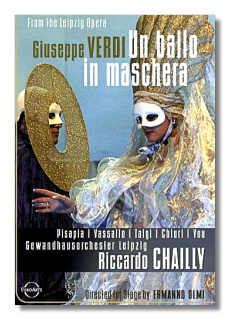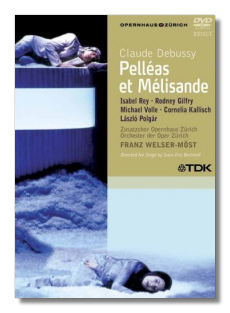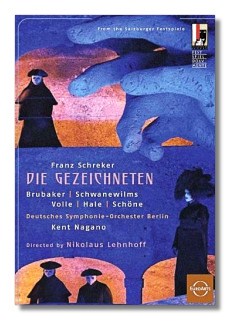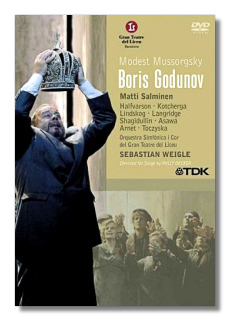
The Internet's Premier Classical Music Source
Related Links
-
Debussy Reviews
Mussorgsky Reviews
Schreker Reviews
Verdi Reviews - Latest Reviews
- More Reviews
-
By Composer
-
Collections
DVD & Blu-ray
Books
Concert Reviews
Articles/Interviews
Software
Audio
Search Amazon
Recommended Links
Site News
 DVD Review
DVD Review
When is a Bargain not a Bargain?

Giuseppe Verdi
Un Ballo in Maschera
- Massimiliano Pisapia - Riccardo
- Franco Vassallo - Renato
- Chiara Taigi - Amelia
- Annamaria Chiuri - Ulrica
- Eun Yee You - Oscar
- Herman Wallen - Silvano
- Tuomas Pursio - Samuel
Leipzig Ballet
Chorus of the Leipzig Opera
Gewandhaus Orchestra Leipzig/Riccardo Chailly
Directed for Stage by Ermanno Olmi
Stage Design & Costumes: Arnaldo Pomodoro
EuroArts 2055108 DVD LPCM Stereo Dolby Digital DTS Anamorphic Widescreen


Claude Debussy
Pelléas et Mélisande
- Rodney Gilfry - Pelléas
- Isabel Rey - Mélisande
- Michael Volle - Golaud
- László Polgár - Arlel
- Cornelia Kallisch - Geneviè ve
- Eva Liebau - Le petit Yniold
- Guido Götzen - Un médecin/Un berger
Zürich Opera House Orchestra/Franz Welser-Möst
TDK DVWW-OPPEM DVD LPCM Stereo Dolby Digital DTS Anamorphic Widescreen
Also available on Blu-ray TDK DVBD-OPPEM: Amazon - UK - Germany - Canada - France - Japan - ArkivMusic - CD Universe - JPC


Franz Schreker
Die Gezeichneten
- Robert Brubaker - Alviano Salvago
- Anne Schwanewilms - Carlotta Nardi
- Michael Volle - Graf Andrea Vitelozzo Tamare
- Robert Hale - Herzog Antoniotto Adorno
- Wolfgang Schöne - Lodovico Nardi
Konzertvereinigung Wiener Staatsopernchor
German Symphony Orchestra, Berlin/Kent Nagano
Nikolaus Lehnhoff - Stage Director
EuroArts 2055298 DVD LPCM Stereo Dolby Digital DTS Anamorphic Widescreen


Modest Mussorgsky
Boris Godunov
- Matti Salminen - Boris Godunov
- Brian Asawa - Fyodor
- Marie Arnet - Xenia
- Stefania Toczyska - Xenia's Nurse
- Philip Langridge - Prince Vassily Ivanovich Shuisky
- Albert Shagidullin - Andrei Shchelkalov
- Eric Halvarson - Pimen
- Anatoly Kotcherga - Varlaam
Orquestra Simfònica i cor del Gran Teatre del Liceu/Sebastian Weigle
Willy Decker - Stage Director
TDK DVWW-OPBORIS DVD LPCM Stereo Dolby Digital DTS Anamorphic Widescreen
Why is this recording of Un Ballo in Maschera a bargain, more of a bargain than many, if not most operas on DVD today? Because it offers fine performances, an imaginative, if controversial staging, and it comes on one DVD, instead of two, as many shorter operas do. I'm not sure why so many operas are issued on two DVDs today. Yes, they often have bonus features, like interviews with the artists and interesting behind-the-scenes material, but they typically have a higher price, too. And when many operas can fit on one DVD, why have two? This Un Ballo in Maschera is a big offering, running 137 minutes, giving the label execs a reasonable excuse for putting it on two discs. But they resisted and we must be thankful. (See Boris Godunov below – it runs even longer and is on one DVD!)
As for the performance… I liked the principals Massimiliano Pisapia and Chiara Taigi, even if the latter flags a bit toward the end of the opera. But perhaps my favorite here is Eun Yee You as Oscar. She is utterly charming with her bold coloratura soprano voice. Annamaria Chiuri as Ulrica is good, too, but I'm not sure that her porcupine-like getup does much for the production.
Perhaps the star of the production, though, is Riccardo Chailly, the newly-appointed conductor of the Gewandhaus Orchestra Leipzig. He possesses a keen sense for the work's drama and its colorful orchestral writing. The orchestra responds with conviction in their playing, the sound is excellent and most other aspects are first-rate. The atmosphere conveyed by Ermanno Olmi's staging is somewhat exotic, but for me it works. Highly recommended.
Why is this Pelléas et Mélisande not a bargain? It's on two discs and is not nearly on the same artistic level in other respects. The singing, conducting and orchestral playing are good – good but not great. The staging, however, is the problem here. Things have a morbid cast, with the principal shaving mannequin-like counterparts – counterparts sometimes in wheelchairs. The setting is arctic, with snow everywhere on the barren set and with lighting that imparts a spooky but not necessarily atmospheric character to the limited action.
But, as I noted in previous reviews, when a recording is pretty good in its aural aspects – the singers, conductor and orchestra all turning in at least decent work – many consumers are willing to overlook the shortcomings in the production – or may even find the controversial production to their taste. The sound is quite good here, and all else is more than acceptable. To those adventurous operatic mavens, this production may have appeal. Others might want to pass it by.
Don't pass by the Schreker opera Die Gezeichneten (The Branded). Its music is beautiful in its lush and alluringly decadent Romantic character, and its story is bizarrely fascinating, at least in this imaginative staging by Nikolaus Lehnhoff. Recorded live at the 2005 Salzburg Festival, this production features weirdly atmospheric sets, insightful phrasing and shaping of the score by the always-brilliant Kent Nagano (is there anyone today who can conduct such a range of operatic works – those of Wagner, Prokofieff, Schreker and others – with such consistent style, intelligence and imagination, better than Nagano?), fine playing by the orchestra and, hardly least, excellent singing by the cast, led by Anne Schwanewilms and Robert Brubaker. These two may not be major figures on the operatic stage today, but they should be. The rest of the cast is fine, too.
I mentioned that the story was 'bizarrely fascinating', so I'd better say something about it. It concerns the painter Carlotta Nardi, who suffers from a heart ailment that will kill her if she experiences excitement, sexual or otherwise. She is pursued by transvestite Alviano Salvago (a humpback, in the original), owner of an island paradise, usurped for orgies and other acts of decadence by Tamare, her other suitor. I won't say anymore, except that the work is dark, full of symbolism and profundity, and fast-moving.
The star here is not the conductor or orchestra, the singers or Lehnhoff – it's Schreker. His style is reminiscent of that of Richard Strauss and Korngold, or better yet, Walter Braunfels, another composer of half-Jewish ancestry – both Schreker and Braunfels suffered at the hands of the Nazis, though the latter did survive in Germany – somehow – while Schreker was harassed and his health broke down, resulting in an early death at 55 years of age in 1934.
At any rate, any recording of this work would be welcome, even an inferior one. But this is a magnificent effort in nearly every aspect, save one – it's cut. Damn it! There had to be something wrong, wouldn't you know? The Zagrosek/Decca CD recording has nearly a half-hour more music and action. Moreover – and maybe this is a second weakness – Schreker's string-dominated scoring at times wears thin on the ear. Still, it's quite beautifully wrought and seems quite appropriate to the action and libretto. So, since this is the only DVD of the work – and one offering what must be assessed as a splendidly-realized effort – it must be given the highest recommendations! Oh, like the Un Ballo DVD, this one is also on one DVD. Snatch it up!
Boris Godunov might well be the best known of the operas here, and, as mentioned above, it too is on one disc – and at 152 minutes running time is within nine minutes of the Debussy Pelléas. This Boris is, as one might expect from that timing, the original version of 1869, and so lacks the Kromi and two Sandomir scenes, but does contain the Vassily the Blessed scene. These additions (including the revised Terem scene) and excision were completed by 1872 by Mussorgsky at the behest of the Mariinsky Theater managers who wanted a greater female presence in the opera. Some listeners still prefer Rimsky-Korsakov's version (1908), which was the standard way to hear this opera until the latter decades of the 20th century. Good though that effort is, this 1869 version and the later one from 1872 are preferable and truer to Mussorgsky's profound art.
The singing is excellent throughout this opera, with Finnish bass Matti Salminen turning in a brilliant performance. Eric Halfvarson as Pimen and Anatoly Kotcherga as Varlaam are nearly as compelling, and the rest of the cast is quite good, too. Sebastian Weigle leads the proceedings with a knowing hand and the Liceu orchestra and chorus respond convincingly. The production, with rather barren, darkish sets, seems to date the happenings to the early-20th century. Whatever – it is effective and quite atmospheric. The sound is vivid and clear. Highly recommended!
Copyright © 2006, Robert Cummings





















